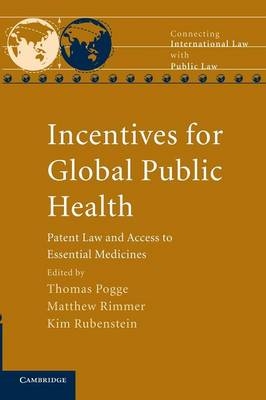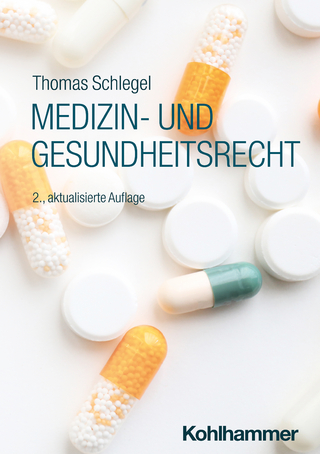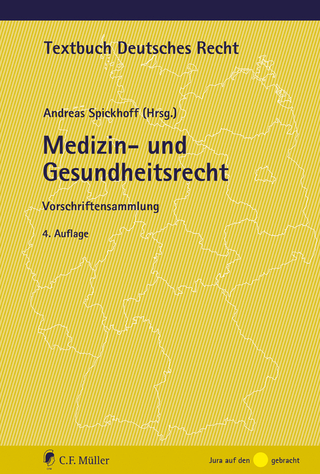
Incentives for Global Public Health
Cambridge University Press (Verlag)
978-1-107-69345-6 (ISBN)
This portrait of the global debate over patent law and access to essential medicines focuses on public health concerns about HIV/AIDS, malaria, tuberculosis, the SARS virus, influenza, and diseases of poverty. The essays explore the diplomatic negotiations and disputes in key international fora, such as the World Trade Organization, the World Health Organization and the World Intellectual Property Organization. Drawing upon international trade law, innovation policy, intellectual property law, health law, human rights and philosophy, the authors seek to canvass policy solutions which encourage and reward worthwhile pharmaceutical innovation while ensuring affordable access to advanced medicines. A number of creative policy options are critically assessed, including the development of a Health Impact Fund, prizes for medical innovation, the use of patent pools, open-source drug development and forms of 'creative capitalism'.
Thomas Pogge is Leitner Professor of Philosophy and International Affairs at Yale University, Professorial Fellow at the ANU Centre for Applied Philosophy and Public Policy (CAPPE), and Research Director at the Oslo University Centre for the Study of Mind in Nature (CSMN). Matthew Rimmer is a senior lecturer and associate director of research at the ANU College of Law, and an associate director of the Australian Centre for Intellectual Property in Agriculture. Kim Rubenstein is Professor and Director of the Centre for International and Public Law (CIPL) in the ANU College of Law, Australian National University.
Introduction: access to essential medicines: public health and international law Thomas Pogge, Matthew Rimmer and Kim Rubenstein; Part I. International Trade: 1. TRIPS and essential medicines: must one size fit all? Making the WTO responsive to the global health crisis Rochelle Cooper Dreyfuss; 2. The TRIPS waiver as a recognition of public health concerns in the WTO Andrew Mitchell and Tania Voon; 3. Public law challenges to the regulation of pharmaceutical patents in the US Bilateral Free Trade Agreements Hitoshi Nasu; 4. Global health and development: patents and public interest Elizabeth Siew Kuan Ng; Part II. Innovation: 5. The Health Impact Fund: boosting innovation without obstructing free access Thomas Pogge; 6. The Health Impact Fund: a critique Kathleen Liddell; 7. A prize system as a partial solution to the health crisis in the developing world William W. Fisher and Talha Syed; 8. Innovation and insufficient evidence: the case for a WTO-WHO agreement on health technology safety and cost-effectiveness evaluation Thomas Faunce; Part III. Intellectual Property: 9. Opening the dam: patent pools, innovation, and access to essential medicines Dianne Nicol and Jane Nielsen; 10. Open source drug discovery: a revolutionary paradigm or a utopian model? Krishna Ravi Srinivas; 11. Accessing and benefit sharing avian influenza viruses through the World Health Organization: a CBD and TRIPS compromise thanks to Indonesia's sovereignty claim? Charles Lawson and Barbara Hocking; 12. The Lazarus effect: the (RED) campaign and creative capitalism Matthew Rimmer; Part IV. Health-Care: 13. Beyond TRIPS: the role of non-state actors and access to essential medicines Noah Benjamin Novogrodsky; 14. Securing health through rights Katharine Young; 15. The role of national laws in reconciling constitutional right to health with TRIPS obligations: an examination of the Glivec patent case in India Rajshree Chandra; 16. Tipping point: Thai compulsory licenses redefine essential medicines debate Jonathan Burton-MacLeod.
| Reihe/Serie | Connecting International Law with Public Law |
|---|---|
| Zusatzinfo | Worked examples or Exercises; Printed music items |
| Verlagsort | Cambridge |
| Sprache | englisch |
| Maße | 152 x 229 mm |
| Gewicht | 710 g |
| Themenwelt | Recht / Steuern ► EU / Internationales Recht |
| Recht / Steuern ► Privatrecht / Bürgerliches Recht ► Medizinrecht | |
| Recht / Steuern ► Wirtschaftsrecht ► Urheberrecht | |
| ISBN-10 | 1-107-69345-4 / 1107693454 |
| ISBN-13 | 978-1-107-69345-6 / 9781107693456 |
| Zustand | Neuware |
| Informationen gemäß Produktsicherheitsverordnung (GPSR) | |
| Haben Sie eine Frage zum Produkt? |
aus dem Bereich


